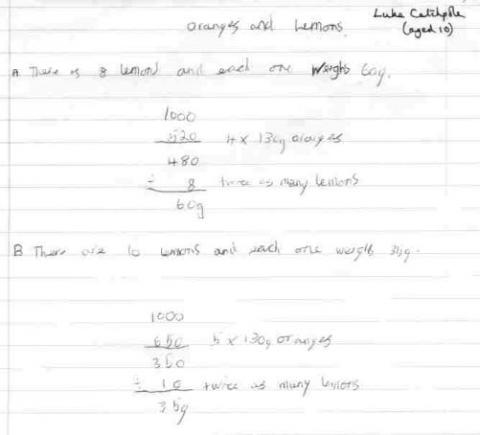Lemons and Oranges
Problem
(If you are working with metric measures go here

On the table there is a pile of oranges and lemons that weighs exactly two and a half pounds.

The oranges all weigh $4$ oz. The lemons are also all the same weight, which is less than $\frac{3}{4}$ of the weight of an orange.
There are twice as many lemons as oranges in the pile.
How many lemons are there and how much does each one weigh?
Getting Started
What is the largest number of oranges you can have and their total weight be less than (or equal to) one kilogram?
If you have one orange how may lemons would there be?
How much would the orange weigh and what is the most the two lemons can weigh?
Student Solutions
Steffi, Emma and Amelia from Girton Glebe Primary School near Cambridge. We think we have the answer:
We think that the answer is $8$ lemons, which have a mass of $60$g, and $4$ oranges.
What strategy did the girls use to arrive at that answer? They explain:
We got the answer by trial and improvement.That last point is very important! All the people who wrote in agree with the girls. But Luke shows his calculations to prove to us that there could be more than one possible answer. Do you agree with Luke?

Pupils at Alice Smith International School in Kuala Lumpur, Malaysia also worked on the Oranges and Lemons problem. They agree with Luke. One of the pupils, Kevin, shows all of the possibilities. They prove that there are in fact two possibilities but that there are no more.
What they already know:
Weights = $1$ orange weighs $130$g. $1$ lemon weighs less than $87$g.To make it easy to read the answers, the pupils use a table:
| Number of oranges | Number of lemons | Right / Wrong |
|---|---|---|
| $1$ | $2$ | Wrong |
| $2$ | $4$ | Wrong |
| $3$ | $6$ | Wrong |
| $4$ | $8$ | Right |
| $5$ | $10$ | Right |
| $6$ | $12$ | Wrong |
| $7$ | $14$ | Wrong |
| $8$ | $16$ | Wrong |
To show how they arrived at each of these answers, here are the calculations:
- $130$g + ($87$g $\times$ $2$) $87$g is max weight for Lemons = $304$g
- ($130$g $\times$ $2$) + ($87$g $\times$ $4$) = $608$g
- ($130$g $\times$ $3$) + ($87$g $\times$ $6$) = $912$g
- ($130$g $\times$ $4$) + ($60$g $\times$ $8$) = $1000$g or $1$kg
- ($130$g $\times$ $5$) + ($35$g $\times$ $10$) = $1000$g or $1$kg
- ($130$g $\times$ $6$) = $780$g. $1000$g - $780$g = $220$g. $220$g divided by $12$ is $18.3$ recurring. It isn't a whole number.
- $130$g $\times$ $7$ = $910$g. $1000$g - $910$g = $90$g. $90$ divided by $14$ equals $6.428571429$. It isn't a whole number.
- $130$g $\times$ $8$ = $1040$g. It is more than $1000$g or $1$kg
